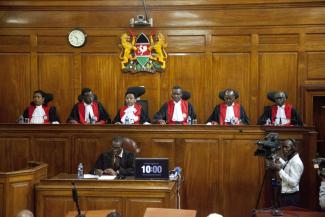Our view
Involve the people

Twenty years later, the World Bank published another World Development Report with a focus on related matters. In 2017, the guiding question was no longer what role the state should play, but how to bring about the institutions and the legislation that would deliver the desired results. The point was that people’s acceptance is essential. What citizens think matters.
The historical background, of course, is that developing countries typically kept the laws and agencies that they inherited from the colonial powers when they became independent. New constitutions spelled out vast aspirations, but the institutional set-up was not designed to make them come true. It remained authoritarian and unresponsive. In many countries, authoritarian rule took hold. During the cold war, the World Bank and other international financial institutions promoted market orthodoxy and largely neglected domestic politics. In the 1990s, it became undeniable that state dysfunction and corruption were problems, so the World Bank spelled out the good governance paradigm in 1997.
Donor governments soon accepted these insights. Unfortunately, it cannot be taken for granted that governments will assume national policy ownership in a responsible manner. Some cling to power in order to exploit the people. How to bring about good governance is an important question, and by tackling it, the World Bank proved that it is a learning organisation. Yes, there are gaps between its theorising and its tangible policies, but that does not mean that the theorising is worthless. The truth is that big bureaucracies only change slowly.
In a similar sense, it does not make constitutions meaningless that grassroots reality tends to differ from their principles. Without aspirations, day-to-day practice will not improve, but only deteriorate. The wider the gaps are, however, the less fit-for-purpose a state’s institutional set-up is.
Good legislation reflects people’s views and helps them to cope with daily life. On that basis, institutions – including an impartial judiciary – can effectively ensure peace and political stability. As the World Bank pointed out in 2017, the acceptance and legitimacy of governance depend on what the people concerned think is right. Notions of fairness and appropriateness are shaped by many things, including traditions, international norms, education, public discourse and citizens’ experience or involvement in public affairs. If, by contrast, legislation is barely implementable or if enforcement requires excessive force, policymakers should figure out what is going wrong (see our briefing on drugs policy).
It is most promising that, in many developing countries, people are indeed becoming more involved in public affairs. On the other hand, it is bewildering to watch US President Donald Trump belittling and disparaging the judiciary. It is far more encouraging so see Kenya’s Supreme Court judges doing their best to rein in the administration of President Uhuru Kenyatta.








